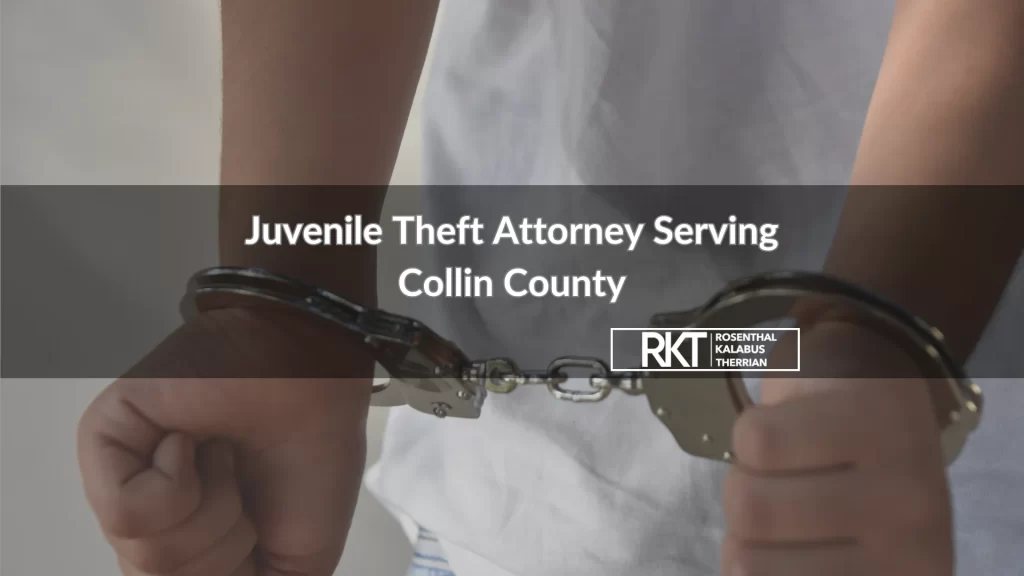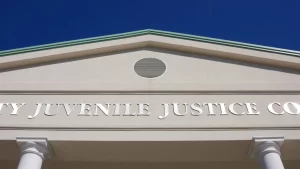
No matter how good they are most of the time, children sometimes use poor judgment, and they do unwise things or even break the law. If your child has been charged with theft, you need a defense attorney who understands property law and the Texas juvenile justice system. The juvenile defense lawyers at Rosenthal Kalabus & Therrian can help. Call us right away at (972) 369-0577 to discuss your case.
Why You Need A Lawyer
If your child has been arrested for stealing, it’s important that a skilled advocate is there to protect their rights. Police and prosecutors are notorious for ignoring defendants’ rights, especially when that defendant is younger and may not know what protections the legal system affords them. A good lawyer can make sure the system doesn’t take advantage of your child’s innocence. A child’s rights in the juvenile system may differ from those of adults, so you need an attorney with a background in juvenile law.
Your lawyer can investigate the circumstances of the arrest and interview witnesses to make sure that the police acted properly, and can put together a strong case to keep them out of the adult justice system. They can make a compelling argument for leniency or even dismissal.
Why You Should Choose Rosenthal Kalabus & Therrian For Your Defense
 The juvenile property crime attorneys at Rosenthal Kalabus & Therrian have helped many Texas families in the same situation as you. We are the largest criminal defense firm in Collin County, and two of our attorneys are certified by the Criminal Law Board, putting them among only 1% of lawyers for their level of expertise in the field of criminal law. We have the resources and the experience to provide you with the highest quality of legal representation.
The juvenile property crime attorneys at Rosenthal Kalabus & Therrian have helped many Texas families in the same situation as you. We are the largest criminal defense firm in Collin County, and two of our attorneys are certified by the Criminal Law Board, putting them among only 1% of lawyers for their level of expertise in the field of criminal law. We have the resources and the experience to provide you with the highest quality of legal representation.
Types of Theft in Texas
Under Texas law, a person commits theft if the person “unlawfully appropriates property with intent to deprive the owner of property.” Texas classifies theft according to the value of the property, but sometimes by the type of property stolen:
- Class C Misdemeanor (Petty) Theft – value less than $50
- Class B Misdemeanor Theft – value $50 or more, but less than $500, or property is a driver’s license or ID card
- Class A Misdemeanor Theft – value $500 or more, but less than $1,500
- State Jail Felony Theft – value $1,500 or more, but less than $20,000, or property of a certain type, such as certain firearms or certain livestock valued at less than $20,000
- Felony of the Third Degree Theft – value $20,000 or more, but less than $100,000, or certain livestock valued at less than $100,000
- Felony of the Second Degree Theft – value $100,000 or more, but less than $200,000
- Felony of the First Degree Theft – value of $200,000 or more
- Civil Penalties – A person who commits theft may be held civilly liable under the Texas Theft Liability Act for damages caused by the theft and possibly a civil penalty of no more than $1,000. A juvenile offender’s parents may be held legally liable, but for no more than $5,000 in damages and no civil penalty.
Juvenile Penalties for Theft
The goal of the juvenile justice system, and the reason juveniles are treated differently than adults, is to focus on rehabilitation over punishment.
- Release to parents – If a child is arrested for a crime like shoplifting and it is a first offense, the court sometimes decides to release them to their parents with a stern warning.
- Fines or restitution – A juvenile court may require the offender to pay a fine or reimburse the owner for the cost of the stolen goods.
- Counseling – A judge could order a juvenile offender to attend counseling or therapy, depending on the child’s psychological needs.
- Probation – The court may require probation for a period of several months or more, during which time the child must meet regularly with a probation officer. Failure to keep probation appointments or further violations may result in additional penalties.
- Detention – For more serious or repeat-offender cases, the court may commit an offender to a juvenile detention center or home. If the court determines that the child’s home life is dangerous or contributes to their delinquency, it may consider placing them in foster care.
- Transfer to adult system – In certain serious and felony cases, the court could decide to transfer the case to the adult system, in which they would be tried as an adult.
Getting a Juvenile Record Expunged or Sealed
Expunction of a juvenile record means that the child’s record may not be revealed or used for any purpose, even by employers conducting a background check. They may even deny having been arrested, except if under oath. In that case, they may state simply that the record has been expunged. A record may only be eligible for expunction if the child was arrested for a misdemeanor or felony and was not charged, was acquitted, pardoned or found innocent, or the charges were dismissed. There may be a waiting period of several months or years before the record may be expunged.
A record may be sealed or subjected to an order of nondisclosure, which would hide it from the general public, but not from criminal justice agencies and certain licensing and employment agencies. These options are available to those guilty of some misdemeanors or felonies, but may require a waiting period depending on the level of the offense.
Speak With a Juvenile Defense Attorney Right Away
If your child has been arrested for theft, contact the knowledgeable Texas juvenile defense lawyers at Rosenthal Kalabus & Therrian as soon as possible. Events progress quickly after an arrest, and you need to make sure your child’s rights are protected and that they have the best representation available.
Our firm has the experience and the legal resources necessary to provide you with the best possible defense so that you can put this stressful situation behind you. Call us at (972) 369-0577 or fill out our contact form to schedule a free consultation to discuss your case.